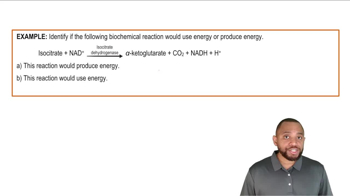Here are the essential concepts you must grasp in order to answer the question correctly.
Temperature Conversion
Temperature conversion involves changing a temperature value from one unit to another, such as Celsius to Fahrenheit or Kelvin. The formulas used are: for Fahrenheit, F = (C × 9/5) + 32, and for Kelvin, K = C + 273.15. Understanding these conversions is essential for accurately interpreting temperature data in different contexts.
Recommended video:
Conversion Factors (Simplified) Example 2
Biochemical Reactions
Biochemical reactions are processes that involve chemical changes in biological systems, often influenced by temperature. In composting, these reactions are crucial for breaking down organic matter, and their rate can significantly affect the temperature of the compost pile. Recognizing how temperature impacts these reactions helps in managing compost effectively.
Recommended video:
Energy Production In Biochemical Pathways Example 1
Composting Process
The composting process is the natural decomposition of organic matter, facilitated by microorganisms. It typically involves several stages, including mesophilic and thermophilic phases, where temperature plays a key role in microbial activity. Understanding this process is vital for producing nutrient-rich compost for gardening and agriculture.
Recommended video:
Processing of Pre-mRNA Concept 1
 Verified step by step guidance
Verified step by step guidance Verified Solution
Verified Solution



 1:30m
1:30m